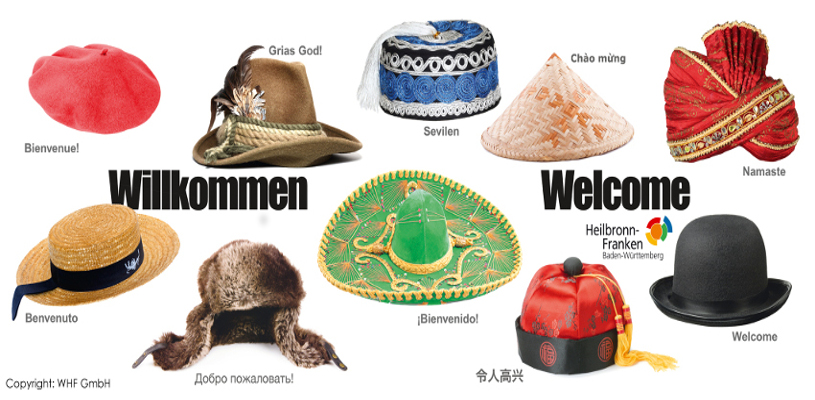

There are many prejudices about Germany and its inhabitants: Germans love beer, Germans love cars, Germans build great cars, Germans don’t have a sense of humour, Germans are obsessed with football − some of these stereotypes are true, some aren’t!
For example, the one about Germans wearing Lederhosen all the time… come on, how would that look? Leather pants and a suit jacket… we’d be so busy laughing at each other our famous efficiency would go out the window! In spite of that common prejudice, we actually do laugh a lot! And as it turns out, not all cars we’ve built are as good as promised.
As you can see, many prejudices about Germans aren’t true but there is one prejudice which perfectly reflects the reality of everyday life in Germany: Germans love rules and Germans obey the rules.
Therefore, it might help get your new life in Germany off on the right track if you stick to the correct side of these beloved rules, particularly in the first couple of weeks. This isn't as easy as it might sound, however, so prepare yourself for a jungle of rules, bureaucracy and various institutions that you will have to deal with. To ease this process, the following checklist shows you which steps are necessary when first arriving in Germany:
Einwohnermeldeamt (Bürgeramt or Rathaus) (residents' registration office usually in the town hall).
Within seven days of arrival.
Bank
Before starting work.
Krankenkasse (health insurance of your choice when you already have a job in Germany).
Before starting work.
If you don’t have a visa for the purpose of employment, contact the local Ausländerbehörde to find out under what conditions you can work in Germany.
Ausländerbehörde
Not later than two months before the expiry date of your visa, it is best directly after entering Germany.
Citizens of countries without visa requirements*: during the non-visa period and before starting work.
Employer.
When you gathered all the necessary documents.
As soon as possible – your employer will be grateful.
Online: www.rundfunkbeitrag.de
After moving in.
Familienkasse der Agentur für Arbeit (family benefits office at the Employment Agency).
Not applicable.
Insurance company.
Not applicable.
Führerscheinstelle (generally at the Stadtverwaltung or Landratsamt).
Important: inform yourself on time which tests are necessary (theoretical and/or practical), as this also depends on the country of origin.
No later than 6 months after entering Germany (during these 6 months you can drive with your home licence which must be either translated into German or you must carry an International Driving Permit), after 6 month also the international driving licence cannot be used anymore.

In tandem with these bureaucratic steps, which you should handle within the first few weeks of arriving in Germany, there are some processes which are automatically completed easing your workload. For example, contrary to many other countries, in Germany you don’t have to apply for your taxpayer identification number (TIN). This will be automatically generated as you register your new place of residence (step one). You will receive your German TIN by mail at your new postal address a couple of weeks after registering.
Furthermore, once you become a member of the health insurance of your choice (step three) you will be assigned a social security number. The insurance company will directly forward the notification of your admission to other social security organizations. Both the social security certificate and social security number will be sent to you by mail. Both the TIN and social security number, are necessary when you want to work in Germany (step five).
Then contact the Welcome Center Heilbronn-Franken for a free consultation. The Welcome Center Heilbronn-Franken is a non-profit organization that supports internationals who come to the Heilbronn-Franken region to live and to work. It informs international professionals and their families about everything they need to know in order to settle, work and live in the region.

The Heilbronn-Franken region is one of the biggest economic regions in Germany located in the north-east of the federal state Baden-Württemberg, noted for unemployment rates that are among the lowest in Germany and great economic strength. Above that, Heilbronn-Franken is an economic hub with the highest density of global market leaders in Germany. Many family-run and medium-sized businesses have established their reputation worldwide in mostly small and narrow market segments. Through continual improvement and innovative ideas they have situated their products and technology at the forefront of the competition. It’s the region’s deeper understanding of “innovation” - making something more useful, better and efficient, be it a process, manufacturing procedure or customer service - which sets their businesses apart. As a region linked to the global economy and with a high demand for skilled workers, many businesses have international employees and economic ties to different places in the world.
We are at home here – and perhaps you will be soon, too?! Heilbronn-Franken is a diverse, colourful region with great natural beauty and many cultural attractions. This is complemented by Hohenlohe, a region for bon vivants; the wine region of Heilbronn; the "Lovely Tauber Valley"(perfect for vacations); and the romantic culture of the Schwäbisch Hall district.
Even if all the partial regions exhibit their own culture and social identity, they do have one thing in common: the "Swabian-Franconian character". Down-to-earth, frugal, and hardworking - these are the characteristics generally attributed to the Swabian people. If you look more closely, however, you will also discover something completely different: with their Franconian-Swabian dialects, the population loves conviviality, has a great sense of humour and still has their ancestors' knack for inventing. It is precisely these advantages that characterise the region's economic and social life.
Heilbronn-Franken is an ideal region for living and working in a central location. With many professional opportunities, its low cost of living, and a string of cultural jewels: fortresses, castles, cloisters and museums, and many outdoor opportunities – Heilbronn-Franken offers an attractive lifestyle to singles and families.
Once you are settled in Heilbronn-Franken, the buddy programme “Welcome Partner Heilbronn-Franken ” offers you good opportunities to establish social contacts with other people in the region. The online platform connects newcomers with people who are already living in the Heilbronn-Franken region and who want to engage in an intercultural exchange.
Check out the website of the Heilbronn-Franken region for information about the area. And don’t forget to drop into the Welcome Center Heilbronn-Franken - to get support for your new life in the Heilbronn-Franken region!